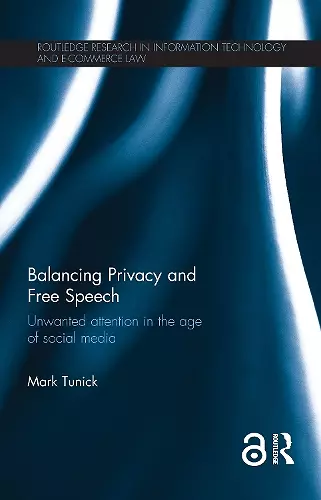Balancing Privacy and Free Speech
Unwanted Attention in the Age of Social Media
Format:Hardback
Publisher:Taylor & Francis Ltd
Published:4th Sep '14
Currently unavailable, and unfortunately no date known when it will be back
This hardback is available in another edition too:
- Paperback£49.99(9781138689756)

In an age of smartphones, Facebook and YouTube, privacy may seem to be a norm of the past. This book addresses ethical and legal questions that arise when media technologies are used to give individuals unwanted attention. Drawing from a broad range of cases within the US, UK, Australia, Europe, and elsewhere, Mark Tunick asks whether privacy interests can ever be weightier than society’s interest in free speech and access to information.
Taking a comparative and interdisciplinary approach, and drawing on the work of political theorist Jeremy Waldron concerning toleration, the book argues that we can still have a legitimate interest in controlling the extent to which information about us is disseminated. The book begins by exploring why privacy and free speech are valuable, before developing a framework for weighing these conflicting values. By taking up key cases in the US and Europe, and the debate about a ‘right to be forgotten’, Tunick discusses the potential costs of limiting free speech, and points to legal remedies and other ways to develop new social attitudes to privacy in an age of instant information sharing.
This book will be of great interest to students of privacy law, legal ethics, internet governance and media law in general.
"The tension between privacy and free speech is ever changing, and technology increases the tension. Citing relevant, seminal cases and using compelling fact patterns for privacy and free speech, Tunick (Florida Atlantic Univ.) uses truly global comparative law sources to explain social and legal norms regarding technology and privacy. He attempts to define privacy in relationship to its aspects that are vital to human life, advocates for a narrower plain view doctrine than most courts hold, and attempts to define what newsworthy events are. Recognizing that there is a need for free speech, he attempts to define where privacy begins and the right of free speech ends. While acknowledging that the creation and use of technology advances ethical and social issues more rapidly than the law can address them, he argues that these issues should be memorialized in the law. This would be an excellent source for delving into the contemporary issues of privacy and free speech." RECOMMENDED: CHOICE- J. M. Keller, Florida Coastal School of Law
ISBN: 9781138791053
Dimensions: unknown
Weight: 476g
238 pages